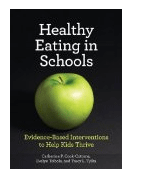“Healthy Eating in Schools: Evidence-Based Interventions to Help Kids Thrive”

“Healthy Eating in Schools: Evidence-Based Interventions to Help Kids Thrive”
By Catherine P. Cook-Cottone, Evelyn Tribole, and Tracy L. Tylka
American Psychological Association
Washington, D.C., 2013
Book constructs model for health-based schools
Reviewed by James K. Luiselli, Ed.D., ABPP, BCBA-D
Federal policies dictate that schools address proper nutrition and food choices of children and youth (5-17 years old), as well as provide them with physical education and wellness activities intended to combat childhood obesity and promote general health. The emphasis on healthy eating and wellbeing is not surprising: students consume many snacks, breakfasts and lunches during their typical 13 years attending school! Critically, school-based intervention must encompass tertiary (symptom-focused treatment), secondary (risk reduction) and primary prevention efforts.
The authors of this book advise that to promote students’ health, “school personnel need a solid understanding of eating behavior and weight-related disorders.” These individuals include teachers, counselors, administrators, coaches and nurses working collaboratively to establish comprehensive school policies governing matters such as nutrition education, eating behavior, weight regulation and exercise. So conceived, the principle purpose of the book is “to help school personnel develop a healthy eating and positive body culture in their school.”
The nine chapters in the book are organized around the concept of intuitive eating, which has gained popularity and research attention in recent years. Defined broadly, intuitive eating embraces our cognitive and behavioral relationships with food by advocating “unconditional permission to eat when hungry,” eating whatever food is desired, consuming food for physical rather than emotional reasons and relying on internal biological cues to determine when and how much to eat. To their credit, and through useful examples and depictions, the authors explain and demonstrate how intuitive eating translates into formative school-based plans.
Upon laying the groundwork of intuitive eating concepts and applications, subsequent chapters in the book offer detailed analysis of childhood obesity and other eating disorders, for example, anorexia nervosa, bulimia nervosa and binge-eating disorder. Each of these and other conditions are discussed according to etiology, personal and external predisposing factors, neurobiology and comorbidity. The authors detail the rich research literature on these topics while summarizing the key practice implications.
Approximately half of the chapters in the book construct a three-tier model for building a health-based school community founded on (a) intuitive eating and nutrition, (b) physical activity, and (c) mindfulness oriented training. I particularly liked the many suggestions for screening and assessing students with eating and body-image problems, including a helpful appendix of easy-to-implement rating scales and questionnaires. The book concludes by updating federal school food policies and referencing several compliance guidelines.
School personnel at every level would be wise to read this book in order to create a truly informed and evidence-based program of healthy eating and food awareness. Similarly, the many recommendations found in the book are relevant at elementary, middle and secondary school grades.
Also, professionals within school consultation and related disciplines can certainly refer to the book when advising administrators and parent groups charged with policy development and implementation. Finally, the book could be adopted for undergraduate and graduate school coursework within clinical psychology, mental health, behavioral medicine, organizational consultation and public health.
James K. Luiselli, Ed.D., ABPP, BCBA-D, is senior vice president, applied research, clinical training and peer review at the May Institute in Norwood, Mass.
Learn more about the book: Healthy Eating in Schools (School Psychology)
